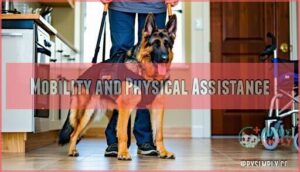This site is supported by our readers. We may earn a commission, at no cost to you, if you purchase through links.

Their medium-to-large size provides necessary strength while maintaining agility for precise work. These dogs form strong handler bonds and demonstrate outstanding problem-solving skills in challenging environments.
However, they require extensive training, proper health management, and aren’t suited for every handler’s lifestyle. Their professional appearance also helps with public acceptance in various settings. Understanding their specific training needs and health considerations can help you determine if this outstanding breed matches your service requirements.
Table Of Contents
- Key Takeaways
- Are German Shepherds Good Service Dogs?
- Key Traits of German Shepherds for Service Work
- History of German Shepherds as Service Dogs
- Types of Service Tasks German Shepherds Perform
- Training Requirements for German Shepherd Service Dogs
- Health and Care Considerations for Service Work
- Choosing and Obtaining a German Shepherd Service Dog
- Frequently Asked Questions (FAQs)
- Conclusion
Key Takeaways
- You’ll get exceptional versatility – German Shepherds excel across multiple service roles, including guide work, mobility assistance, medical alerts, and PTSD support, due to their high intelligence and strong problem-solving abilities.
- You’re investing in proven reliability – With over 90 years of service dog history and consistent top-three rankings for cognitive abilities, these dogs demonstrate outstanding task retention and adaptability in demanding situations.
- You’ll need significant resources – Professional training costs $6,000-$65,000, lifetime ownership reaches $40,000-$60,000, and you’ll need to provide 2+ hours of daily exercise plus mental stimulation throughout their 9-13 year lifespan.
- You’re getting a physically capable partner – Their 75-95 pound size provides necessary strength for mobility tasks while maintaining agility, though you’ll need to monitor for breed-specific health issues like hip dysplasia and degenerative myelopathy.
Are German Shepherds Good Service Dogs?
German Shepherds excel as service dogs due to their notable combination of intelligence, loyalty, and physical capabilities. These Canine Companions consistently rank among the most effective Assistance Animals, with over 90 years of proven success in Disability Support roles. Their strong Dog Human Bond makes them naturally attuned to their handler’s needs, while their trainable nature allows them to master complex Service Dog Roles.
The German Shepherd Breed possesses ideal characteristics for service work: medium-to-large size (75-95 pounds), impressive strength, and keen problem-solving abilities. Service Dog Laws recognize them as legitimate service animals, and their professional appearance improves public acceptance. Research shows German Shepherds demonstrate outstanding task retention and adaptability across various disability types.
Service Dog Training organizations frequently select this breed because they’re "built for the job" – combining physical stamina with emotional stability. Their versatility spans from guide work to medical alert tasks, making them reliable partners for individuals requiring thorough support. When properly trained and matched, German Shepherds consistently deliver life-changing assistance. The breed’s high trainability levels make them an ideal choice for service dog roles, requiring careful training and socialization to reach their full potential.
Key Traits of German Shepherds for Service Work
When you’re evaluating German Shepherds for service work, their specific traits directly determine their effectiveness in helping people with disabilities. These dogs possess a unique combination of intelligence, physical capabilities, and temperament characteristics that make them standout candidates for various service roles.
Intelligence and Trainability
Working intelligence sets German Shepherds apart from many breeds. These dogs consistently rank in the top three for cognitive abilities, mastering service dog training with impressive learning speed. Their problem-solving skills shine during unexpected situations, while adaptive training methods work particularly well with their inquisitive minds. Mental stimulation keeps these intelligent and hardworking companions sharp throughout their careers.
Loyalty and Bonding
You’ll find these canine companions naturally develop profound emotional connections that make them outstanding service animals. German Shepherds form unbreakable handler-dog relationships through their protective instincts and devotion.
Here’s why these intelligent and hardworking dogs excel as faithful partners:
- Deep emotional support – They read their handler’s needs instinctively
- Unwavering dedication – Once bonded, they remain completely committed
- Protective instinct – Natural drive to safeguard their handler
- Consistent responsiveness – Reliable reactions to commands and situations
- Strong dog-human bond – Forms lasting partnerships essential for service work
Physical Strength and Size
You’ve seen how loyalty matters, but muscle structure and body proportions also set German Shepherds apart. As a large breed, they’re active and athletic, with weight limits ranging from 75 to 95 pounds.
Size variations allow for versatility. With proper strength training, these strong and healthy dogs handle physically demanding tasks, making them reliable partners among large breed dogs.
Temperament and Adaptability
Beyond their impressive physical capabilities, you’ll find German Shepherds possess outstanding emotional stability and stress tolerance that’s essential for service work. Their temperament makes them naturally:
- Confident and approachable – well-socialized German Shepherds adapt effortlessly to crowded environments
- Emotionally stable – they maintain composure during medical emergencies or handler distress
- Socially skilled – their obedient nature helps them navigate public spaces without reactivity
This environmental adaptation, combined with strong social skills, creates the foundation for successful confidence building throughout their service career.
History of German Shepherds as Service Dogs
German Shepherds pioneered service dog work when they first guided soldiers blinded by mustard gas during World War I in Germany. Their success led to the first service dog arriving in the US in 1929, establishing a legacy that’s now spanned over 90 years of dedicated assistance work.
Early Use in Germany
German Shepherds originated in Germany during the late 1800s, where Captain Max von Stephanitz developed the breed specifically for working capabilities. These Service Pioneers demonstrated outstanding Working Dog Traits that caught the attention of military and civilian handlers.
The breed’s German Origins emphasized intelligence and loyalty, making them ideal candidates for assistance work. This Breed Development established the Historical Significance that would later influence global Service Dog History programs worldwide.
Role in World Wars
During both World Wars, you’d witness thousands of German Shepherds proving their mettle in combat scenarios that would define their breed’s reputation forever. These outstanding working dogs demonstrated peerless courage under fire, establishing the foundation for modern Service Dog History.
Their War Efforts included five critical Combat Roles:
- Messenger duties – carrying vital communications across dangerous battlefields
- Medical assistance – leading wounded soldiers to safety and transporting supplies
- Sentry work – patrolling trenches and detecting enemy movements
- Ammunition transport – carrying essential supplies to front lines
- Search and rescue – locating injured personnel in hazardous conditions
This Military Service created genuine War Heroes whose Historical Significance extends far beyond warfare. Allied forces quickly recognized the breed’s superior capabilities, adopting German Shepherds for similar roles. Their battlefield performance directly influenced the development of modern Service Dogs, proving that this breed possessed the intelligence, loyalty, and resilience needed for life-saving work. The breed’s development as working dogs has been well-documented and showcases their versatility and capabilities.
Expansion to Modern Service Roles
Today’s German Shepherds have evolved far beyond their wartime origins, embracing diverse Modern Roles across disability support services. Their intelligence makes them natural companions for individuals seeking thorough Disability Support in our modern world.
Service Expansion includes mobility assistance, psychiatric service dogs for PTSD, and medical alert work. These working dogs now partner with Assistive Technology, using Adaptive Training methods to master complex Service Dog Tasks.
Types of Service Tasks German Shepherds Perform
German Shepherds excel at multiple service tasks due to their intelligence, strength, and adaptability. You’ll find them working as guide dogs, mobility assistants, medical alert dogs, and psychiatric service animals across various disability communities.
Guide Dogs for The Visually Impaired
Guide dogs represent one of German Shepherds’ most recognized service roles. These canine assistants excel at sight guidance through their outstanding intelligence and strong work ethic. Their natural protective instincts make them ideal disability support partners for blind navigation.
German Shepherds demonstrate notable capabilities as guide dogs through:
- Obstacle navigation – identifying curbs, poles, and overhead hazards
- Traffic assessment – stopping at intersections and monitoring vehicle movement
- Route memorization – learning frequently traveled paths and destinations
- Disobedient disobedience – refusing unsafe commands when necessary
This breed’s size and strength provide stability during mobility tasks, while their calm temperament helps guarantee reliable performance in crowded environments. German Shepherds consistently rank among top service dog breeds for visually impaired aid.
Mobility and Physical Assistance
Beyond guiding visually impaired individuals, German Shepherds excel as mobility aids for people with physical disabilities. Their impressive 75-95 pound build provides steady balance assistance during transfers and daily living tasks.
These service dogs can retrieve dropped items, open doors, and offer vital physical support for handlers with mobility issues. Their strength and reliability make this breed particularly effective for thorough mobility assistance work.
Medical and Allergy Alert
With over 300 million olfactory receptors, German Shepherds excel at Medical Assistance and Allergy Detection tasks. These service dogs can identify dangerous blood sugar changes in diabetics and detect life-threatening allergens like peanuts before reactions occur. Their Alert Systems achieve 85-100% accuracy in controlled studies.
Seizure Response and Disability Support capabilities make German Shepherds invaluable for thorough medical service work. German Shepherds are often utilized for service dog training due to their intelligence and loyalty.
PTSD and Psychiatric Service Work
German Shepherds excel in PTSD and Psychiatric Service Work through their natural ability to detect handler anxiety and provide crisis intervention. These psychiatric service dogs perform tasks like interrupting nightmares, creating physical barriers during panic attacks, and alerting to PTSD triggers.
Their emotional stability and strong bonding capabilities make them effective psychiatric service animals for mental health support.
Training Requirements for German Shepherd Service Dogs
Training your German Shepherd for service work requires structured preparation that begins in puppyhood with extensive socialization and basic obedience commands.
You’ll need to decide between professional training programs, which can cost $6,000 to $65,000, or owner-training approaches that demand significant time commitment and expertise in task-specific skills.
Early Socialization and Obedience
Successful puppy socialization usually begins around eight weeks when German Shepherds are most receptive to new experiences. Basic obedience training using positive reinforcement helps establish canine communication patterns essential for service work. Early training creates obedient, approachable, and well-socialized dogs who display ideal German Shepherd characteristics.
This foundation guarantees your future service dog develops the confidence and reliability needed for public access work. Effective service dog training requires understanding of dog training methods to guarantee the dog’s success in various roles.
Task-Specific Training
Once you’ve built that foundation, you’ll shape these skills into real-world service tasks. Task analysis breaks complex behaviors into manageable steps, while skill building layers each component systematically. Behavior modification techniques address specific challenges, and ongoing obedience drills maintain reliability. Scent work training boosts natural detection abilities.
Here’s the structured approach professional trainers use:
- Task Analysis: Break complex service tasks into small, teachable components
- Skill Building: Layer individual skills progressively using positive reinforcement
- Behavior Modification: Address breed-specific challenges like reactivity or fear
- Obedience Drills: Maintain foundational commands under distraction
- Scent Work: Develop natural detection abilities for medical alerts
This systematic method guarantees your German Shepherd masters disability-specific tasks reliably. Professional programs usually require 120+ hours of task-specific training, though owner-trained dogs can succeed with proper guidance and consistent practice sessions. Effective service dog training involves understanding and applying dog training methods to achieve superior results.
Ongoing Exercise and Mental Stimulation
Active service dogs need consistent physical and mental challenges to maintain peak performance. Your German Shepherd requires a structured Daily Walk Routine combined with Mental Stimulation Games to prevent behavioral issues. Exercise-Induced Calming helps manage their high energy, while Environmental Enrichment Activities support cognitive development. Effective dog training utilizes training tools to achieve desired behaviors and prevent undesirable ones.
| Physical Exercise | Mental Stimulation |
|---|---|
| 2+ hours daily walking | Puzzle feeders and treat games |
| Canine Sports Training sessions | Scent work and tracking exercises |
| Swimming or agility work | New route exploration |
| Fetch and retrieval practice | Command refresher training |
Dog Intelligence in German Shepherds demands continuous engagement. Without proper stimulation, these service dogs develop destructive behaviors that compromise their effectiveness. Service Dog Training programs emphasize that Dog Breed Characteristics include an outstanding working drive requiring structured outlets for success.
Professional Vs. Owner Training
You’ll face a pivotal decision between professional Service Dog Organizations and owner training when preparing your German Shepherd for service work. Professional programs offer Trainer Certification and structured Training Methods, while owner training provides flexibility but increases Owner Liability concerns.
Consider these key factors:
- Cost Comparison: Professional training ($6,000-$65,000) versus owner training expenses
- Public Access rights: Organizations guarantee legal compliance and reduce handler anxiety
- Training Methods: Structured programs versus individualized approaches
Professional organizations deliver consistent results through certified trainers, while owner training requires significant time investment and expertise development.
Health and Care Considerations for Service Work
When you’re considering a German Shepherd for service work, you’ll need to understand their health profile and long-term care requirements.
These dogs face specific physical challenges that can impact their ability to perform demanding service tasks throughout their working years.
Common Health Issues
German Shepherds face several health challenges that can impact their service dog careers. Hip dysplasia affects up to 19% of the breed, while elbow dysplasia impacts nearly 15%. These joint issues can severely limit mobility and working ability.
Degenerative myelopathy, with carrier rates reaching 20%, causes progressive paralysis. Gastric dilatation-volvulus poses life-threatening emergencies, and skin allergies affect 12% of German Shepherds, potentially interfering with service tasks.
Lifespan and Physical Maintenance
Your German Shepherd’s lifespan averages 9-13 years, requiring consistent Health Checks and Injury Prevention strategies throughout their service career.
Large Breed Dogs face unique challenges that demand proactive physical maintenance. Regular grooming and joint monitoring become essential as these Service Dogs age.
German Shepherds need structured care routines to enhance their working years while maintaining ideal health standards.
Nutrition and Exercise Needs
Your German Shepherd’s nutritional foundation directly impacts their service work performance and longevity. Large Breed Dogs require specialized Diet Planning that accounts for their intense Exercise Routines and demanding workload as Service Dogs.
Essential Nutrient Balance considerations include:
- Calorie Intake: 1,800-2,400 calories daily based on activity level
- Protein requirements: 22-26% for sustained energy and muscle maintenance
- Joint-supporting supplements: Glucosamine and omega-3 fatty acids
- Feeding Strategies: Multiple smaller meals to prevent bloat risks
Proper Dog Health Considerations guarantee your working companion maintains a healthy Dog Temperament while handling daily service tasks effectively. A balanced diet may also involve dietary supplements to support overall health and performance.
Choosing and Obtaining a German Shepherd Service Dog
When you’re ready to find your German Shepherd service dog, you’ll need to research reputable breeding organizations that specialize in service dog training and placement. The process involves significant financial investment and legal considerations, but proper selection guarantees you’ll get a well-trained companion that meets both ADA requirements and your specific assistance needs.
Breeder and Organization Selection
When choosing from among reputable breeders and training organizations, you’ll want to verify trainer certification and organization standards before making your selection. Look for breeder accreditation through recognized bodies that maintain strict dog breeding standards for German Shepherds.
Professional service dog organizations usually provide thorough breed selection guidance and maintain high-quality dog breeding and selection protocols that guarantee your future service dog meets rigorous performance standards.
Service Dog Costs
Budget considerations matter substantially when obtaining German Shepherd service dogs. Training expenses range from $10,000-$25,000 for professional programs, while owner-led training costs $2,500-$7,000. Equipment costs include specialized leashes and vests totaling $200-$500 annually. Veterinary fees average $800-$1,500 yearly, plus monthly food costs of $60-$100. Certification fees and maintenance budgets add ongoing expenses, making lifetime ownership costs $40,000-$60,000 total.
Understanding service dog costs breakdown is essential for preparing for these expenses. Equipment and veterinary fees contribute significantly to the overall financial commitment.
Legal and Public Access Considerations
Beyond budget considerations, you’ll need to understand your legal protections when partnering with a German Shepherd service dog. The Americans with Disabilities Act (ADA) grants extensive Public Access Laws, ensuring your service animal can accompany you into restaurants, stores, and housing.
Air Travel Regulations under the Air Carrier Access Act provide additional protections for flying. The US Department of Justice enforces these Service Animal Laws, making ADA Compliance mandatory for businesses providing Disability Accommodations nationwide.
Frequently Asked Questions (FAQs)
Can German Shepherds detect specific medical conditions?
Like medical bloodhounds with four legs, you’ll find German Shepherds can detect diabetes through blood sugar changes, seizures before they occur, and life-threatening allergens, making them outstanding medical alert companions.
How long does service dog training take?
Service dog training usually takes 18-24 months from puppyhood through graduation. You’ll see intensive socialization, basic obedience, and specialized task training phases before your dog becomes a certified working companion.
What age should training begin for puppies?
Like a young tree requiring early pruning to grow strong, you’ll want to start training your German Shepherd puppy during puppyhood, usually around 8-12 weeks old. Early socialization and basic obedience commands establish the foundation for successful service work.
Are there size limitations for service dogs?
No specific federal size limitations exist for service dogs, though you’ll need to take into account practical factors. Your dog must perform tasks effectively while fitting in airplanes, public spaces, and your daily environment comfortably.
Do German Shepherds work well in apartments?
German Shepherds can adapt to apartment living, but you’ll need to provide substantial daily exercise and mental stimulation to prevent destructive behaviors from developing in confined spaces.
Conclusion
Like a master craftsman selecting the finest tool for precision work, choosing whether German Shepherds are good service dogs requires careful evaluation of your specific needs. These outstanding canines offer proven intelligence, unwavering loyalty, and superb versatility across multiple service disciplines.
However, their success depends on proper training, health management, and lifestyle compatibility. When matched correctly with handlers’ requirements, German Shepherds consistently demonstrate why they’ve remained foremost service animals for nearly a century.
- https://servicedogtrainingschool.org/online-school/certified-intensive-seizure-alert-service-dog-training-course
- https://www.vetdogs.org/AV/DogPrograms/PTSDServiceDog.aspx
- https://www.brigadoondogs.org/
- https://www.sayersanimalhospital.net/customer-resources/becoming-a-service-dog-training-and-temperament-are-key-factors/
- https://screening.certapet.com/


















